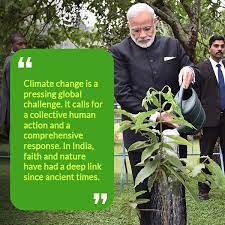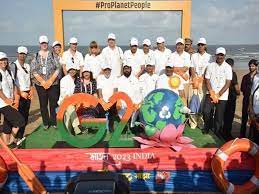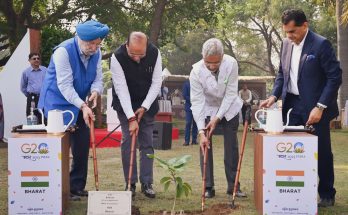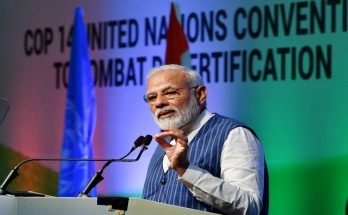
India’s approach to environment and sustainable development during its G20 Presidency reflects a forward-looking and comprehensive strategy that addresses the complex challenges of the 21st century, writes Dr. Vibha Dhawan.
In recent years, the global discourse on environmental sustainability and sustainable development has gained unprecedented momentum. As nations grapple with the pressing challenges posed by climate change, resource depletion, and ecological degradation, India has emerged as a prominent advocate for a comprehensive and inclusive approach to addressing these issues. The Sixth Assessment Report of the United Nations Intergovernmental Panel on Climate Change (IPCC) released in 2023 has unequivocal evidence that we are way off track of maintaining global warming to 1.5 degrees Celsius. This is also the year that India assumed the presidency of the G20, offering a unique opportunity to provide global leadership and shape the climate and social equity agenda from the perspective of the Global South. The theme for India’s G20 Presidency, “VasudhaivaKutumbakam” (One Earth, One Family, One Future), reflects India’s outlook on fostering global cooperation and solidarity for a sustainable and inclusive future.
The theme underscores the need for global unity, collaboration, and collective efforts to build a resilient and equitable world that respects the principles of sustainable development as articulated in the Brundtland Commission Report as Our Common Future, “development that meets the needs of the present without compromising the ability of future generations to meet their own needs.” India’s G20 Presidency places emphasis on human-centric development, green initiatives, cooperation in the fields of technology, inclusivity and holistic growth. Apart from emphasising collective action, our Hon’ble Prime Minister has eloquently articulated, “… a divided world cannot fight a common challenge. That is why our approach during our G20 Presidency and otherwise has been to unify the world on this issue for what can be done. The poor and the planet, both need to be helped. India is moving ahead on this with not only a positive attitude but also a mindset of driving solutions” and in a way, this sets the agenda and indicates the next course of collective action.
India: Voice for the Global South
By championing equitable and fast-tracked actions, India has not only emerged as an architect of the global agenda but also a driver of change, sustainability and growth in the Global South. As the impact of climate change is particularly pronounced in the Global South, India is amplifying the key challenges, opportunities and aspirations of developing and developed economies and calls for unified action. India’s leadership in climate action has been to emphasise bringing together global opportunities and capacities in an equitable manner. India pioneered and shown leadership in setting up the International Solar Alliance (ISA), and has also collaborated with fellow G20 members to establish large-scale green hydrogen production capacity. India has pushed for transformative ideas. India, positioned as an energy hub, could offer sustainable energy solutions at affordable rates, potentially resolving the overarching energy challenge. India has shown through the recent success of Chandrayaan that we can develop successful technologies just at a fraction of the cost of many technologically advanced countries. Underscoring the urgent need to scaling up finance for executing the collective vision of fostering global cooperation and solidarity for a sustainable and inclusive future, the Indian G20 Presidency has set forth a blueprint to achieve the spirit of “One Earth, One Family, One Future”, which can fructify only through the inclusion of the Global South in the pursuit of a low-carbon climate-resilient world. India’s role as a voice for the Global South is integral to international discourse and decision-making. India’s active engagement and leadership reflect the nation’s commitment to promoting fairness, equity, and sustainable development on a global scale, while also advocating for the specific needs and priorities of developing countries.

Leading Energy Transition for a Just and Resilient Future
As the world’s required capacity of energy increases with each passing day, the need for clean energy sources has never been higher. However, a balance between energy sustainability, affordability and reliability is imperative. At the heart of India’s sustainable development strategy is its commitment to climate action and the promotion of renewable energy sources. As part of its G20 Presidency, India has championed the development and implementation of ambitious climate goals, aligned with the objectives of the Paris Agreement. India’s ambitious target of net zero emissions by 2070 and to have 50 percent of its power generation capacity come from renewable energy sources by 2030, showcases its determination to transition towards a low-carbon energy future.
Demonstrating remarkable progress, India has surpassed its commitment made during the 21st Conference of the Parties (COP 21) – Paris Summit by deriving 40 percent of its power capacity from non-fossil fuel sources—achieving this milestone nearly a decade ahead of time. Notably, the proportion of solar and wind energy in India’s energy portfolio has experienced a remarkable surge. Among major economies, India stands out for the unparalleled growth of its renewable energy sector, with projections indicating the doubling of new capacity additions by 2026. India also boasts a prominent standing as a significant producer of modern bioenergy and aims to significantly upscale its application across various sectors.
In this transformative journey, green hydrogen emerges as a pivotal player in achieving the net-zero aspiration. India’s ambition to emerge as a global epicentre for green hydrogen production and exports is notable, with the potential to generate a considerable demand of five million tonnes—replacing conventional grey hydrogen in industries like refineries and fertilizers. This transformative shift could translate to the mitigation of 28 million tonnes of CO2 emissions for this initial volume, with the potential for a monumental 400 million tonnes of CO2 abatement by 2050 as the green hydrogen economy evolves and flourishes. With regard to this, the Government of India proposed initiatives such as the proposed solar cities and parks, the National Green Hydrogen Mission, and the Green Energy Corridor. It is also rolling out policy measures and incentives that enable the uptake of green energy and technology, including the production-linked incentive (PLI) scheme for entities that set up manufacturing facilities for clean technology. As a large developing economy with over 1.3 billion people, India’s climate adaptation and mitigation ambitions are not just transformational for India but for the entire planet. A more concrete announcement under India’s G20 presidency is the Global Biofuel Alliance led by Brazil, India and the United States. The alliance seeks to accelerate sustainable biofuels deployment in support of the global energy transition and aims to foster cooperation and enhance the adoption of sustainable biofuels, particularly within the transportation sector including aviation and shipping. The shift becomes all the more important in light of international regulations such as cross-border carbon tax.

Positive Agenda: Lifestyle for the Environment (LiFE)
The energy crisis looms large over the G20 countries especially as their development depends on ensuring energy security and with developmental progress energy usage is bound to increase. Once again, appealing to the concept of “One Earth, One Planet, One Family” and also recognising the diversity of cultures, India’s Mission Lifestyle for the Environment (LiFE) rallies the global community, both individuals and institutions, to embrace LiFE as a worldwide grassroots mass movement. We must realise that every individual is responsible for and is impacted by climate change, though to varying degrees. The essence of LiFE revolves around a shift from wasteful consumption to purposeful and conscious utilization, safeguarding and conservation of our environment and simultaneously achieving the SDGs. LiFE places the onus on each individual and the collective to lead a lifestyle harmonious with the Earth, devoid of harm. India in its G2O Presidency advances the concept of LiFE, and encourages individuals to live a sustainable lifestyle and safeguard the resources for future generations. It emphasises individual accountability and reflection as to how each of us can conduct our daily life in a more sustainable way.
The Road Ahead
To sum up, India’s approach to the environment and sustainable development during its G20 Presidency reflects a forward-looking and comprehensive strategy that addresses the complex challenges of the 21st century. By prioritising climate action and renewable energy India is setting a positive example for global cooperation and leadership in the pursuit of a more sustainable future. India has done this through its effective advocacy for the Global South, setting an example for sustainable energy transitions and pioneering the LiFE mission that promotes responsible climate behaviour. As India continues to lead discussions and initiatives within the G20 framework, its commitment to environmental preservation and sustainable development serves as a beacon of hope and inspiration for nations around the world. By showcasing the interconnectedness of economic growth, social well-being, and environmental protection, India’s G20 Presidency offers valuable insights into how a balanced and holistic approach can pave the way for a more resilient, inclusive and prosperous future for all. n
Bibliography
Global Biofuel Alliance: One of the priorities under India’s G20 Presidency. PIB, Delhi. https://pib.gov.in/PressReleasePage.aspx?PRID=1898274
G20 DWG: India’s Mission LiFE for Green Transition. PBNS. https://newsonair.com/2022/12/16/g20-dwg-indias-mission-life-for-green-transition/
G20 transition to clean energy should include global South: PM. Statesman News Service. https://www.thestatesman.com/india/g20-transition-to-clean-energy-should-include-global-south-pm-1503203319.html
India’s clean energy transition is rapidly underway, benefiting the entire world – Analysis. International Environmental Agency.https://www.iea.org/commentaries/india-s-clean-energy-transition-is-rapidly-underway-benefiting-the-entire-world
Dr. Vibha Dhawan is the Director General of TERI, The Energy and Resources Institute. Dr.Dhawan served as the Vice-Chancellor of TERI School of Advanced Studies from 2005-2007. She is a Fellow of the National Academy of Sciences, India. She is a task force member of a number of committees of the Department of Biotechnology (DBT), the Biotechnology Industry Research Assistance Council (BIRAC), the Biotech Consortium India Limited (BCIL) etc. She is currently serving as Adjunct Professor, Consul General South Asia Partnership, Michigan State University. She is the winner of the Indian Women Achievers Sammaan 2017, Women Leadership Agriculture Award 2016, First Biotech Product and Process Development and Commercialization Award 2000, the Kamal Kumari National Award for Science and Technology and the first All India Biotech Association (AIBA) award in 1998. She has authored 6 books and over 50 publications.
Author Profile
- India Writes Network (www.indiawrites.org) is an emerging think tank and a media-publishing company focused on international affairs & the India Story. Centre for Global India Insights is the research arm of India Writes Network. To subscribe to India and the World, write to editor@indiawrites.org. A venture of TGII Media Private Limited, a leading media, publishing and consultancy company, IWN has carved a niche for balanced and exhaustive reporting and analysis of international affairs. Eminent personalities, politicians, diplomats, authors, strategy gurus and news-makers have contributed to India Writes Network, as also “India and the World,” a magazine focused on global affairs.
Latest entries
 Business with IndiaOctober 25, 2024Modi’s new mantra for blending India’s Dynamism with Germany’s Precision
Business with IndiaOctober 25, 2024Modi’s new mantra for blending India’s Dynamism with Germany’s Precision China ConnectOctober 23, 2024“Our Diversity and Belief in a Multipolar World Are Our Strengths”: PM Modi at BRICS Summit
China ConnectOctober 23, 2024“Our Diversity and Belief in a Multipolar World Are Our Strengths”: PM Modi at BRICS Summit DiplomacyOctober 23, 2024“BRICS: A Beacon of Hope for Global Unity and Reforms “
DiplomacyOctober 23, 2024“BRICS: A Beacon of Hope for Global Unity and Reforms “ DiplomacyOctober 23, 2024Deepening Ties Amidst Global Turmoil: PM Modi Meets Iranian President at BRICS Summit
DiplomacyOctober 23, 2024Deepening Ties Amidst Global Turmoil: PM Modi Meets Iranian President at BRICS Summit






